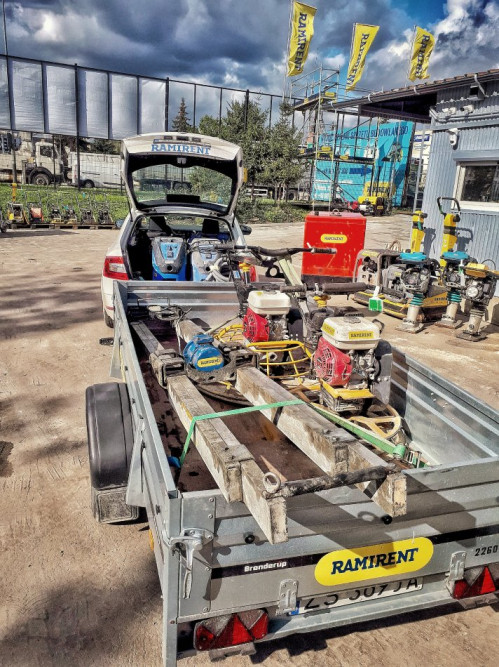What should I consider when choosing a concrete trowel?
Concrete trowels are machines that are very commonly used on construction sites. They are used in renovation work and in all work involving the laying of floors or concrete slabs. When choosing a concrete trowel, it is important to pay attention to two basic parameters: the trowel diameter and the type of drive.

The third important aspect when hiring a trowel is the brand. If you need a machine that is efficient and reliable in operation and comfortable to use, you should go for brand-name equipment - such as the Dynapac, Atlas Copco or Enar concrete trowels offered by Ramirent
What tasks does the trowel perform?
The concrete trowel allows the concrete surface to be levelled quickly and very accurately. Using them, you can also rub curing materials or preservatives into the floor surfaces. Concrete trowels can be used not only for levelling and smoothing concrete, but also for polishing and grinding floors. Therefore, they can be used not only for making new floors, but also for renovating and refreshing concrete surfaces.
The widespread use of concrete trowels is due to the fact that smooth, imperfection-free concrete surfaces are not only more aesthetically pleasing but also more durable in use. They are also much better suited as a substrate for laying tiles, panels, parquet and other finishing materials.
Internal combustion or electric drive?
Diesel-powered trowels are the optimum choice wherever large areas need to be worked quickly and efficiently. An unquestionable advantage of power trowels with combustion drive is their complete independence from power sources. This is particularly important on open-air construction sites, where it is not possible or very expensive to pull up the power supply. What is also undisputed is that the absence of a power cable gives much greater freedom of movement and the ability for the operator to focus solely on the job in hand.
Diesel-powered trowels are powerful machines that are ideal for large areas. The only limitation in the use of diesel-powered concrete trowels can be the very poor ventilation of the premises where the work is carried out. However, this happens mainly in low, small rooms where concrete trowelling can be successfully carried out with hand tools. Vibrating and smoothing bars can also be used in such conditions.
Which trowel diameter should I choose?
The basic parameter of a concrete trowel is the working diameter. There are trowels available with disc diameters ranging from 60 to nearly 120 cm. It is also worth checking how large the discs can be used with a particular model. A large diameter ensures fast and accurate work on large areas. However, a large unit will not always be the most useful. When choosing the diameter of the trowel disc, you need to take into account the overall surface area of the floor, but also the width of the area to be trowelled, e.g. in narrow corridors it will be much more convenient to use a smaller disc. The weight of the machine is also an important consideration. Larger machines can weigh more than 100 kg, which precludes the possibility of being carried or loaded by one person.